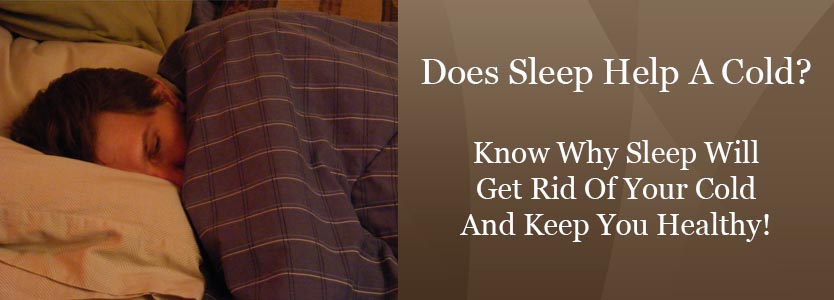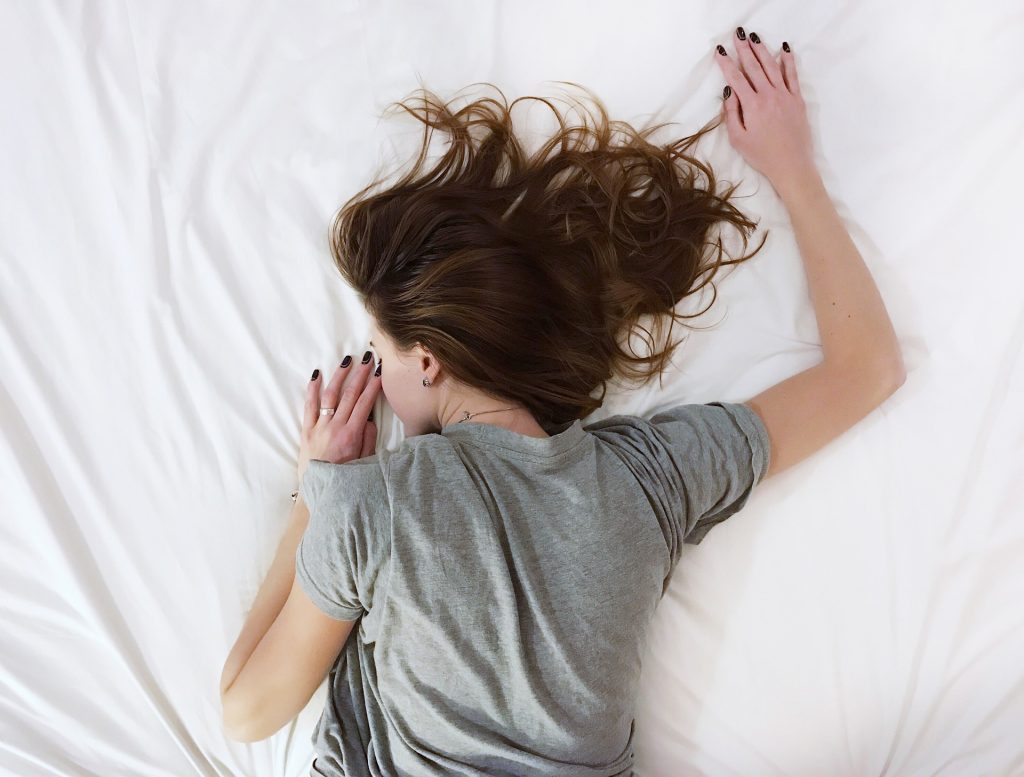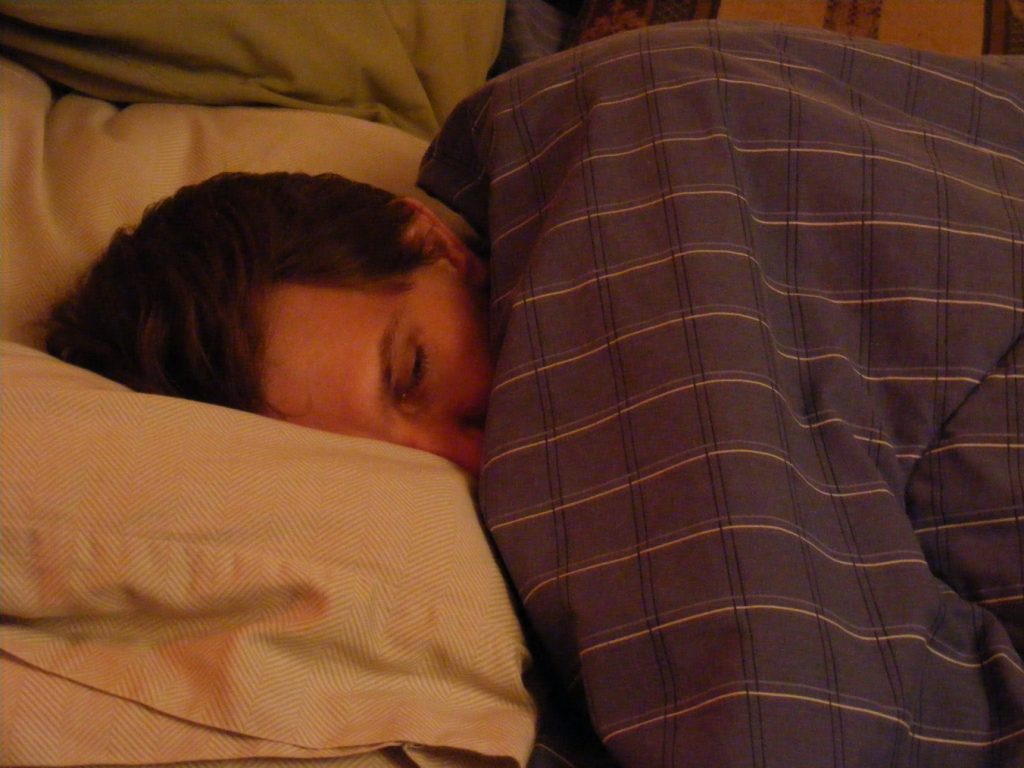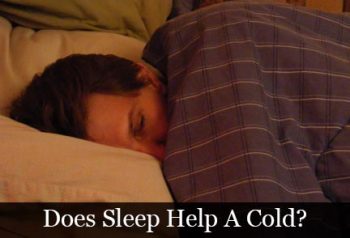
We’ve all heard it before when we have a cold or the flu. They say “sleep it off” and rest, and soon you’ll start to feel better quicker than you normally would. But does sleep help a cold or the flu? Or maybe you’re up all night with a sore throat or a cough. What benefit could sleep have to help us feel symptom free and get rid of our cold? Well let’s take a deep dive into this question and see if sleep really helps us feel better no matter what they symptoms are.
As you continue to read the details in this article you’ll find that additional sleep does help a cold go away faster. All of those terrible symptoms you have can be helped! So the advice that has been passed on for generations is true. Not only can sleep help get rid of a common cold, but the proper amount of sleep each can help prevent you from becoming sick in the first place.
How Sleep Impacts Your Health
As we dive into the topic if sleep helps your cold let’s first take a look at how sleep impacts your health. It’s all related. A 2015 study from the University of Southern California, San Francisco concluded that the less sleep you get the more likely you are to get sick. More specifically, the study concluded that people who slept six hours a night or less were four times more likely to catch a common cold when exposed to a virus. This compares to people who slept more than seven hours a night. In other words, this means that sleeping keeps you healthy!
The following statement was made by Aric Prather, PhD, who is the assistant professor of Psychiatry at UCSF and lead author of the study.
“Short sleep was more important than any other factor in predicting subjects’ likelihood of catching cold. It didn’t matter how old people were, their stress levels, their race, education or income. It didn’t matter if they were a smoker. With all those things taken into account, statistically sleep still carried the day.”
Potter, Lisa Marie, and Nicholas Weiler. “Short Sleepers Are Four Times More Likely to Catch a Cold.” Short Sleepers Are Four Times More Likely to Catch a Cold | UC San Francisco, www.ucsf.edu/news/2015/08/131411/short-sleepers-are-four-times-more-likely-catch-cold.
Additionally, prior studies from Prather have also shown that people who sleep fewer hours aren’t protected as well against illness after receiving a vaccine. Uh oh. So even if we have a vaccine sleeping less can reduce how much the vaccine works which still increases our chances of getting sick.
I think we’re beginning to figure out here that sleep and rest are great for your colds and overall health! So now that we understand that sleep itself helps fight off a common cold let’s further understand why sleep is good for a cold.
Why Is Sleep Good For A Cold?

So now we know that sleep is good for a cold let’s finally dive into why it helps your cold and your overall health. And it all has to do with what happens to your immune system with sleep. Specifically, lack of sleep can greatly impact the T Cells in your immune system and the T Cell count. The T Cells are only a small part of the immune system. There are also B Cells which are also impacted. Both of these cell types fight off virus and bacterial infections. When your body can’t fight off these infections is when you’ll start to show the symptoms of being sick.
So does sleep help a cold? Absolutely! By “sleeping it off” you’re rejuvenating your immune system and giving your body the ability to fight off the viral or bacterial infection. Not only is sleep good if you have a cold, but it can also act as a preventative to getting a cold in the first place.
The proper amount of sleep will keep your immune system strong and functioning as it’s supposed to function. A healthy immune system will fight off those viral and bacterial infections. Of course, your body can’t fight off every illness but at least your giving your body a better shot to fend off or get rid of a common cold or sickness.
What Are T Cells?
T Cells are white blood cells, and they’re critical cells in your body that help to fight off disease. These are cells that respond to viral infections and also give other cells in your immune system a boost to fight off infections. So they’re extremely important to your health!
T Cells originate in the bone marrow. Without going into all the nitty gritty details they are then sent to tissue or circulate in the blood stream or lymphatic system.
What Are B Cells?
B Cells are also white blood cells that originate in the bone marrow. These cells are also critical to keeping you healthy. B Cells bind to specific antigens which initiates an antibody response. These cells also help to fight off infections. But these cells are also have a “memory antibody” function. It’s actually a critical part of your bodies immune system.
So what does this memory antibody function do? Well, to put it simply the B Cells remember what happens during previous infections so the immune system knows how to fight future infections.
Best Way To Sleep When You Have A Cold (Without Meds)

When you have a cold or the flu it’s easy to pop some pills or down some liquid to help you sleep through the night. But maybe you don’t want to take pills. Or maybe medications don’t always work for you. Are all the medications healthy for you? A lot of people don’t like the way they feel after taking medications because of side effects.
Does sleep help a cold if you can’t ever actually get to sleep? Of course not!
So let’s talk about some of the best ways to sleep when you have a common cold or flu without taking medications. It’s all natural! These recommendations also help if you have a cough or sore throat. Although sleep may not be the complete cure to a virus it will definitely make a contribution to helping you better. Try these tips to help get you through your symptoms and on your way to getting healthy.
1. Try Sleeping With A Humidifier
One of the biggest culprits to cold and flu season is dry air. A humidifier can help solve both of these problems. By adding moisture to the air you can help lubricate your nasal passages and your throat if it’s sore. This could also help a cough or a scratch throat since the moisture will have the same impact on your throat.
Please make sure you keep your humidifier clean. If it’s not cleaned regularly mold and bacteria can build up and ultimately do you more harm than good.
2. Take A Steamy Shower Before Bed
A steamy shower is great, especially, if you don’t have a humidifier. The steamy shower would have a similar effect that a humidifier does, but you just won’t have the continual moisture added to the room during your sleep. Moisture will be added to the air, and it’ll open up your nasal passages to help clear out your airways. It should also help you to wind down and relax at night.
3. Add Some Pillows To Your Bed
Have you ever laid down to go to sleep when you’re sick, and all of a sudden your head clogs up and you feel worse than you did before? Well, it happens because when you lay down it gives the mucus a chance to collect in your nasal passages. The collection of mucus can also cause a cough if you didn’t already have one. So when you go to sleep at night (or during the day) prop yourself up a little bit to help clear the nasal passages. Be sure to elevate your whole head. You don’t want to be bending your neck because it can cause neck pain and possibly restrict your airways.
Tip: If you have a sore throat also try to gargle with warm salt water before you go to bed.
4. Make A Saline Rinse
For a long time I used NeilMed to help clear my nasal passages. I started doing this after a nose surgery and it was recommended by my doctor. But you can make your own saline rinse at home. This mix will help to safely flush out your nose which would also take some of the infection out with it.
The recipe is:
- 1/4 teaspoon salt
- 1/4 teaspoon baking soda
- 8 oz. warm distilled water (Do not use tap water because that could be dangerous)
5. Drink A Hot Cup Of Water
You might see a lot of places recommend a hot soup, tea, or some other beverage before you head to sleep at night. We recommend that you just stick with a warm cup of water. Although a nice cup of tea sounds great most teas have caffeine in them which can help keep you awake.
A warm cup of water will keep you hydrated and add some steam for your nasal passages. But there’s more! It also cleanses digestions and helps eliminate toxins from your body. Lastly, to also promote sleep a cup of hot water will increase blood circulation and calm down your central nervous system.
Final Thoughts On How Sleep Helps A Cold Or Flu
A few twists and turns aside I think we can answer our question on how does sleep help a cold. Part of the process is knowing not just if sleep is good for a cold, but WHY sleep helps to get rid of a common cold or the flu. A better understanding can go a long way.
In addition to sleep it’s also important to stay hydrated when you’re trying to get rid of a cold. Most of our recommendations for the best ways to sleep when you have a cold involve not just hydration but moisture content in the air. It’s how you help clear your nasal passages and alleviate a sore throat.
If you’re sick we hope reading this article helps you feel better quicker. If you’re healthy, hopefully you learned some preventative things you can do to stop the next illness from coming your way.

